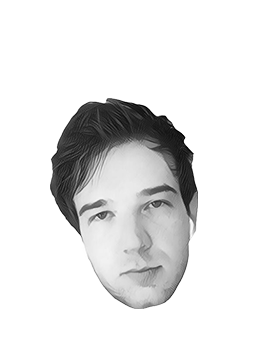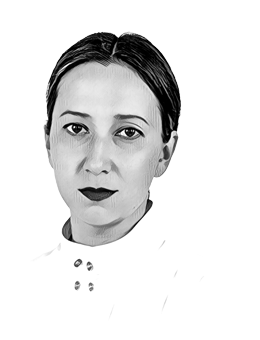An abundance of news — especially bad news — sometimes robs a person of empathy. They have no compassion for anyone and do not want to help. They pay no mind to important events such as the military operations in Ukraine or disasters around the world. If this happens to loved ones, they seem callous to us, as if they are hiding their heads in the sand and refusing to look at reality. But when it concerns someone personally, they may wonder whether everything is okay with them.
Contemplative practices teacher Viktor Shiryaev explained to 7×7 why feelings disappear, how to bring them back, and why.
Viktor Shiryaev is a teacher of modern contemplative and somatic practices, a mindfulness instructor [instruktor maindfulnes], and an expert in adult maturation. He runs the Telegram channel Act of Presence, where he discusses mindfulness and meditation techniques, and does consultations.
— Is it normal to read the news and not to feel anything? How can people not have an emotional response to photos from Mariupol, to stories about injustice or emergencies?
— I think it’s fine. Everything that happens to people is governed by certain mechanisms. There are several of them involved here.
First, things regarded as “close to home” are felt more acutely. Photos of an earthquake in Turkey or a tsunami in Haiti that causes thousands of deaths are very poorly registered by our minds. People who have no relatives or direct contacts in Mariupol may not feel anything — and not because they lack empathy, but because it is happening to someone else and is therefore abstract.
The second mechanism is numbness, withdrawal. This is also a normal stress reaction, a defense mechanism. If you worry all the time, it is impossible to live and work normally. During our lifetimes, there has not been a single day that there were no wars on the planet. If you feel all this and constantly suffer from it — after all, empathy is generally premised on the idea that “when you hurt, I hurt too” — life will be uncomfortable.
The third mechanism is rationalization — that is, persuading yourself that what is happening is normal. This reduces empathy and sensitivity. For example, you think, “They’re all Nazis, it’s okay.” The fact that they are human beings is obscured by this “rational” argument.
The fourth mechanism is hardening. We are going through a collective trauma. Russians [rossiyane, i.e., Russian citizens] throughout the post-Soviet space [sic] are the result of the negative selection that has occurred over the last one hundred years: dekulakization, the Stalinist purges, the Holodomor, the forcible transfer of populations, World War II, the Stalinist crackdowns, the anti-cosmopolitan campaign, the Doctors’ Plot, the Afghan and Chechen wars, and so on. All this leaves scars on the psyche and on people’s behavior. Scar tissue is qualitatively different from normal skin. And while the idea of self-care and letting go of the past is more clearly expressed in the west, people in Russia become callous because they just put up with things: “I can take it,” “I’m no weakling,” “Hit me harder.”
— Do people come to you and say, “I don’t feel anything and I want to fix it”?
— Sensitive people who are trying to live in the midst of all the horror and stress, without turning away from it and disengaging, come to me more often. The complaint “I don’t feel anything” is a more advanced case. A person should not only take note of this, but also understand that it causes them harm. There is this meme:

Decreased sensitivity ultimately complicates life, because it affects both your emotions and your body. It makes your life poorer.
— What should I do if earlier I took a keen interest in the news but now I don’t feel anything — if numbness, as you call it, has set in? Is it worth deliberately reading even more news to make myself feel something?
— You should not specifically trigger [triggerit’] yourself by reading the news, looking at war photos or something like that. This is pointless, because if the “chill” arose due to our unwillingness and inability to see things, then by forcibly increasing the intensity of the stimulus we will only make ourselves feel worse.
What makes sense is gently restoring your sensitivity per se.

How to regain sensitivity
Viktor Shiryaev’s advice
- Observe the sensations in your body — name them: touching, warm, smooth.
- Observe your state of mind — try to name it: tense, calm, flustered, pleased.
- Ask yourself how you are doing now more often. Give a specific answer.
- Deploy scenarios to wind down the stress cycle: bath/massage, shaking [sheiking], physiological sigh, time with no phone and TV in the company of loved ones and/or in nature, high-quality physical activity.
— So, freezing up is a normal reaction on the part of the psyche? Or is it an occasion to consult with a psychologist?
— Ideally, of course, it should not come to this. So-called preventive medicine is much better than treating a disorder that has already taken hold.
Regular psycho-emotional fitness training — all kinds of methods of skillful self-support, meditation, mindfulness practice, physical training, and therapy — help to ready us for higher psycho-emotional loads. It works the same way as physical exercise: a trained body copes with challenges more easily.
You definitely need to go to specialists when you can’t “ride it out.” They have ways to help you.
— There are situations when one person in a couple, a group of friends or a family avidly watches the news, reacts to it and wants to discuss it, while the others don’t want to delve into anything and go about their business, saying that it doesn’t concern them and they don’t want to get bogged down in other people’s troubles. What should one do when there are different levels of sensitivity and different needs, when it is important for one person to experience and feel, while the other person wants to remain neutral?
— Respect the other’s feelings and needs. Talk about your feelings without trying to convince the other person and prove that your way of doing things is “right.” It is possible that it is only right for you. It is possible that you’re right on principle. But when we feel that we are being attacked, we want to defend ourselves, not to open up to the other person.
Dialogue — the opportunity to be seen, heard and accepted — involves opening up towards each other, thawing out.
— If a person is worried whether everything is okay with them, how can they can validate [validirovat’] their “feeling of insensitivity”?
— Everything that happens to us is normal. Not in the sense of being “good,” but in the sense of that’s how things are. It is normal to “freeze up” in moments of acute stress or amidst prolonged stress, because this is how the self-preservation instinct works.
The self-preservation instinct is much bigger and older than us. Even relatively feeble emotions diminish access to the rational and adult parts of the psyche — we are “captured” by emotions, let alone by truly tragic events.
It is important to understand and accept this, to carefully and gently regain access to your emotions. Not through force, violence and “overriding,” but through a kind attitude, gentleness and love.
Source: “Explosions, catastrophes, deaths — zero emotions: an expert explains whether it’s normal not to react to the news,” 7×7, 8 February 2023. Translated by the Russian Reader
The little green van sped down the road, the Russian forces just across the river. Inside, Halyna Luhova, the mayor of Kherson, cradled a helmet in her lap and gazed out the bulletproof window.
When the first shell ripped open, directly in the path of the van, maybe 200 yards ahead, her driver locked his elbows and tightened his grip on the wheel and drove straight through the cloud of fresh black smoke.
“Oh my god,” Ms. Luhova said, as we raced with her through the city. “They’re hunting me.”
The second shell landed even closer.
She’s been almost killed six times. She sleeps on a cot in a hallway. She makes $375 a month, and her city in southern Ukraine has become one of the war’s most pummeled places, fired on by Russian artillery nearly every hour.
But Ms. Luhova, the only female mayor of a major city in Ukraine, remains determined to project a sense of normality even though Kherson is anything but normal. She holds regular meetings — in underground bunkers. She excoriates department heads — for taking too long to set up bomb shelters. She circulates in neighborhoods and chit-chats with residents — whose lives have been torn apart by explosions.
She chalks up any complaints about corruption or mismanagement — and there are plenty — to rumor-mongering by Russian-backed collaborators who are paid to frustrate her administration.
Kherson, a port city on the Dnipro River, was captured by Russian forces in March; liberated by Ukrainian forces in November; and now, three months later, lies nearly deserted. Packs of out-of-school children roam the empty boulevards lined with leafless trees and centuries-old buildings cracked in half.
[…]
Source: Jeffrey Gettleman, “‘They’re Hunting Me.’ Life as a Ukrainian Mayor on the Front Line,” New York Times, 10 February 2023
Therapy groups for those who can’t hack it
The Order is a group narrative therapy service. Uncertainty, wars, stress, trauma, isolation — you don’t have to cope with these difficulties in life alone. We’ll help you keep from losing yourself and regain control over your life’s story.
What does group therapy offer?
1.
You reflect on and accept what you have experienced in a safe environment
2.
You sort out the mess of your attitudes and fears
3.
You get the support of professional psychologists and mentors [mentorov]
4.
You see yourself from a new angle — through the eyes and experience of others
5.
You find your own network of supportive people
6.
You improve your communication skills and escape social isolation
7.
You realize the value of your own life and relationships
8.
You gain the inner strength to go on living
Feedback from group members

Andrei Sotnikov
POET-MUSICIAN-PRODUCER-PEACEMAKER
These art therapy sessions are literally an experiment in collective self-healing using creative improvised means that release everyone’s creative impulses. It’s an incredible experience of uniting people, one so necessary in our strange time. Despite the extreme difficulty of attending online sessions due to the blackouts in Kyiv, I look forward to each one and get ready knowing that I’m going to touch a miracle. The amazing original technique and wonderful company keep my soul warm and light for a long time after. Thank you for being there!

Maria Vershinina
JOURNALIST, WRITER, TEACHER
It’s a very strange feeling doing group therapy on Zoom: it’s like watching a TV series. Kit Loring has so much sincerity and empathy — I couldn’t believe what was happening was real, because I hadn’t met such people before. And the careful way he uses words and his tone were alarming at first. I got used to it over time. I like watching how people open up inside [sic] the session. And if a connection is established with the members of the group, it becomes very easy to trust them and speak openly. You understand that everyone has their own pain, but it’s also familiar to you now or it was familiar in the past.

Hanna Shtyka
3D-ARTIST
After the initial sessions, I feel that I’ve started to undergo psychological metamorphoses. Thanks to correctly posed questions and images, I am able to get in touch with experiences and sensitive moments, to “unpack” my emotions. Everything is done as carefully as possible: Kit Loring and the curators create a safe space in which it’s not scary to open up and be heard. I recommend it to everyone who wants to look inside themselves through the prism of creativity and start working with deep experiences using the tools of words, colors and images.

Yefim Balakin
GRAPHIC DESIGNER
The group sessions with Kit Loring are incredibly fulfilling and healing. It’s like a healing touch. The warmth of understanding spreads throughout the body. It really is like magic. Pulling out your painful experiences, opening up to other people in the group, all of them so different, and helping them too, you become stronger and begin to understand what else you can do with all of it. Complicated events and memories are no longer so complicated and forbidden. And, it seems, I no longer want to cover my eyes with my hands, I want to look into someone else’s eyes.

Nastya Rogozhkina
ECOFEMINIST
Due to traumas, it had become difficult for me to create (and often function), but in The Order, unexpectedly, I was pleased to find an accepting online space and validation [validatsiia] of my opinions and experiences. The meetings create a trusting atmosphere and mutual understanding. After the sessions, I have a pleasant feeling of unity with people, albeit strangers. Every time this magic happens in my mind —”Oh, I’m not the only one who feels and thinks like this” — and it’s worth a lot. I recommend these groups if you’re lonely and you find it difficult to talk about your traumas and thoughts with others.
How does it work?

PSYCHOMETRIC SCREENING
You go through testing that helps you formulate your goals and helps us place you in a mini-group
MINI-GROUPS
We break the cohort into small groups. You have your own separate chat and meetings once a week
CONTRACT WITH YOURSELF
Signing a contract with yourself and supporting each other’s efforts is a vital part of the healing
ONLINE SESSIONS EVERY WEEK
The cohort first meets with an expert on Zoom, and then the groups move on to intimate interaction — all this lasts two and a half to three hours
MATERIALS FOR HEALING
Regular exercises designed by our specialists enable you to rethink significant events and attitudes
REWRITING YOUR STORY
Practices and tools, songs, drawing, communication and poems help you process fears and anxieties
SUPPORT AND CARE
You are guided by psychologists and curators to whom you always turn for advice
TRANSFORMING EXPERIENCE
You rethink difficulties with the healing power of creativity and find your own bearings

Each cohort is led by experienced psychotherapists and psychologists, experts, lecturers and mentors who help you transform your experiences.

Kit Loring
PSYCHOLOGIST, PSYCHOTHERAPIST
Certified British clinical art therapist, clinical supervisor and trainer, member of the British Association of Drama Therapists, co-founder and co-director of the humanitarian art therapy organization Ragamuffin International (South Wales, UK).

Dilya Gazizova
PSYCHOLOGIST, PSYCHOTHERAPIST
Certified art therapist and trauma therapist. Teacher, translator, organizer of therapy and training groups. Co-founder of the Art Therapy House YART. Member of the International Expressive Arts Therapy Association (IEATA) and the Kazakhstan Association of Behavioral Analysts. Member of INTEGRATIO International Community of Psychologists and Psychotherapists. Artist.

Olga Normanskaya
PSYCHOLOGIST, PROCESS THERAPIST
Senior expert at Meta, a service for selecting proven psychotherapists. Over 12 years of experience in the field of psychotherapy. Over 8 years of experience as a therapist working with psychological trauma. Over 5 years of experience consulting and evaluating midlevel and senior managers.

Anastasia Semko
CLINICAL PSYCHOLOGIST FOR CREATIVE PEOPLE
Organizer and leader of art therapy groups and support groups. I use an integrative approach in my work, relying on both research and cultural aspects. Lecturer for several youth organizations, designer of psychological games. Over five years of experience working with trauma.

Alex Kotlowitz
JOURNALIST, REPORTER AND FILMMAKER
A star of American journalism who has worked for the world’s best publications — The New Yorker, The Wall Street Journal, and The New York Times Magazine. He has twice received the Peabody Award, one of the oldest and most prestigious awards in journalism, and his bestseller There Are No Children Here was included in a list of the 150 most influential books of the twentieth century.

Philip Gourevitch
JOURNALIST, REPORTER, WRITER
He became famous for his debut book about the aftermath of the genocide in Rwanda, one of the bloodiest in the history of mankind. For more than 30 years, he has been telling poignant stories from all over the world, has received dozens of professional awards and has written four books. He has been published in The New Yorker and edited the magazine The Paris Review.

Zhanna Bobrakova
ART MENTOR, CONTEMPORARY ARTIST, CURATOR
Lecturer at the Moscow School of Contemporary Art (MSCA) and the British Higher School of Art & Design (BHSAD). Did her master’s at Saint Martins. Collaborated with the Tate Museum in London. Zhanna’s projects have been exhibited at Saatchi, Tate Modern, Kochi Biennale, Moscow Biennale, Cube and many other venues. Her works are in the collection of the Russian Museum and private collections around the world.
1 MARCH — 1 JUNE
- Leader: Kit Loring, British psychotherapist
- Three months of art therapy
- 12 three-hour online group sessions
- Exercises for handling fear and anxiety
- Psychological care and support
₽9,990/month
- Payment once a month
- Total amount: ₽29,700 [approx. 375 euros]
Source: The Order. Translated by the Russian Reader. Thanks to Egor Mostovshikov for the inadvertent heads-up.

Hi, this is Dasha Manzhura!
Today I would like to share with you an idea that was occurred to me during a discussion in the course “Trauma Narratives in Contemporary Russian Literature” (part of the Smolny Beyond Borders project). In 2021, I graduated from the Faculty of Liberal Arts and Sciences [of St. Petersburg State University aka Smolny College], which now looks completely different after authorities started cracking down on it.
We were discussing the connection between narrative and trauma, and a female colleague of mine asked why we reassemble our identity after traumatic events. Why do we give up our previous identity? I found the comments of the other participants very interesting.
Many of the responses focused on the fact that the reassembling one’s identity is necessary, because otherwise the unprocessed trauma would begin to burst out in unexpected places, and you would feel it pulling you down. Along with this, the question arose: Can an identity be false? Here, the answers focused on the fact that self-deception won’t help, because you know the truth. Many of the participants concluded that false identity = problems that (do not) express themselves in reality and that poison life.
I thought about this discussion for a long time (I don’t always manage to get involved in the moment), and the responses made me ask even more questions:
- Do I know the truth about what has happened and is happening to me?
- If for some reason I decide to create a “false” identity for myself, then maybe it functions after all? And if it does function, then how?
First: Do I know the truth about what has happened and is happening to me?
I can say with confidence that I am aware of what has happened to me in my life, when it happened, and how it happened like no one else. It is on this understanding that I string together my narrative about myself. But to be honest, some of the stories that I know about myself in detail I either relate to others and sometimes to myself in abridged form, or I change the conclusions that I had once come to.
Sometimes my conclusions change in the process of growing up, which means that the truth can also be flexible. And it doesn’t happen because I cannot or do no want to be honest with myself or with others. Everything I tell is my truth, what I know myself. But some of the events in my life are imprinted in my memory, as if I saw them from the outside, and some through the eyes of my parents, while still other stories I remember vaguely.
Is it possible in this case to talk about a division between true and false narratives, even if I am not sure myself where the boundaries of truth lie?
Second: If for some reason I create a “false” identity for myself, then maybe it functions after all?
I will give the stupidest example on the planet. It’s from the TV series Hunters, which I decided to watch to take my mind off things.
Attention: there will be a spoiler next, which will be highlighted in color in the newsletter.
TW: The Holocaust
The Hunters live in the US in the 1970s and catch Nazis who somehow escaped punishment and live new lives under assumed names. One of the central characters of the series is Meyer Offerman, a former concentration camp inmate and the leader of the Hunters. At the end of the first season, it transpires that Offerman has been impersonated by Wilhelm Zuchs, a Nazi doctor from Auschwitz. After Soviet troops liberated the camp, Zuchs was imprisoned, but was able to escape. He killed the real Offerman, had plastic surgery and started a “new life.” According to Zuchs-Offerman, he “lived like a Jew and became a Jew”: he went to synagogue, learned the language, and read the Torah. As he himself claims, he understands that he cannot atone for his crimes, but neither is he any longer the Nazi he once was.
End of spoiler
Can at least one of the identities we have be false? We might have been different one, two, three years ago, and this doesn’t limit our potential for change. How do we recognize when we’re lying to ourselves? Or not to ourselves, but to others, if this lie doesn’t reinforce the narrative we have already constructed? And why can’t a story that might seem untrue to someone be your story? Who has the last say in determining the veracity of someone’s identity?
I don’t have clear answers to this question. What’s more, I am sure that these questions should be regularly addressed and we should check whether the answers we’ve already given still work. I myself have delved into this discussion to set in motion the already nearly ossified answers in my head. I think checking whether our beliefs correspond to reality is a good exercise for each of us. And here as well an attempt to catch oneself out in a lie might become an artificial restriction on change.
Perhaps the trauma needs to be lived through, perhaps the identity may be false. And yet, I don’t believe that while traumatic events are still ongoing any of us can make definite judgments about our own or someone else’s identity and its truth.
Whether you do a “good job” of living throughh your personal and social traumatic events is up to you to decide, just as it’s up to you evaluate your narratives about yourself. But this doesn’t dissolve us of responsibility for the ethical choices (and their consequences) that I/we make every day.
Source: Dasha Manzhura, Anti-War Newsletter #347 (DOXA), 13 February 2023. Ms. Manzhura is an editor at DOXA. Translated by the Russian Reader






























